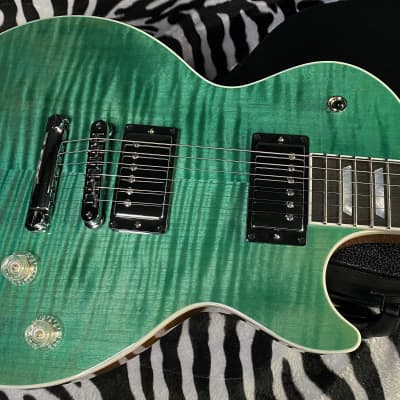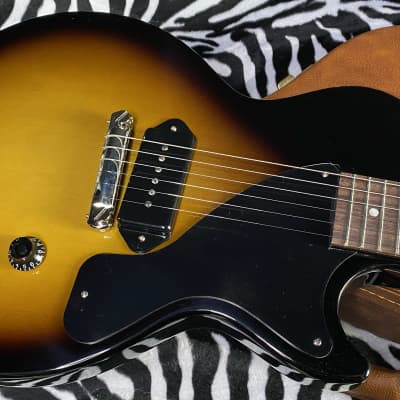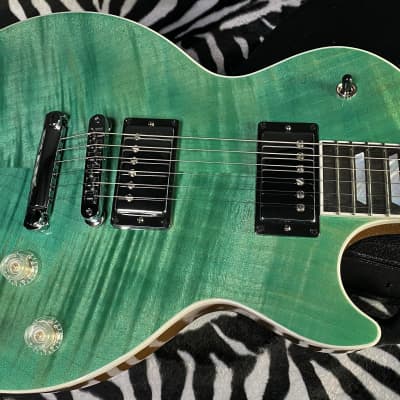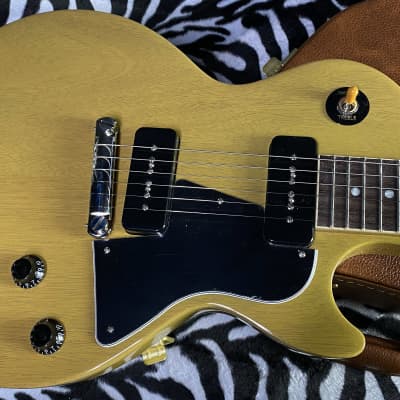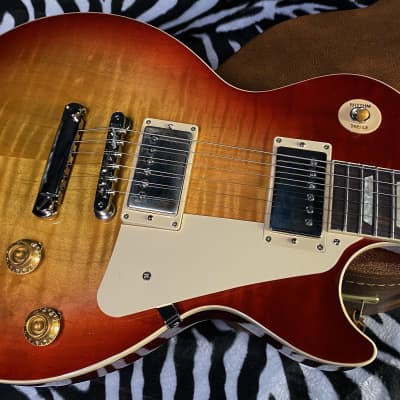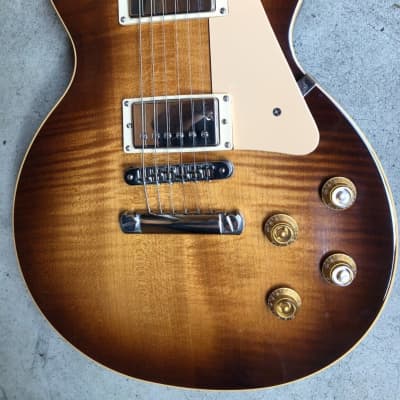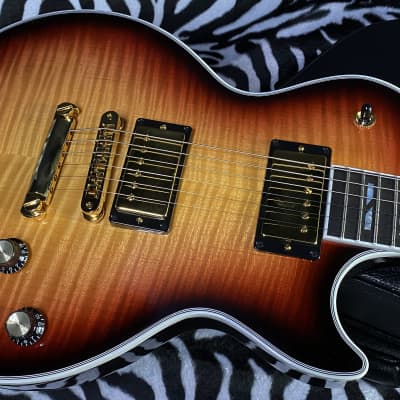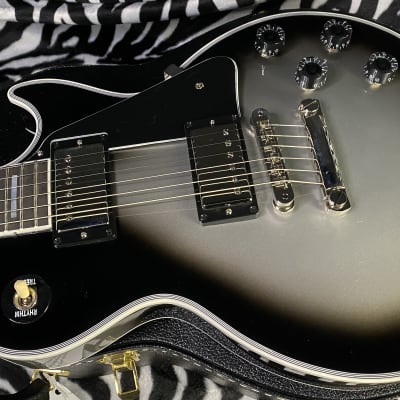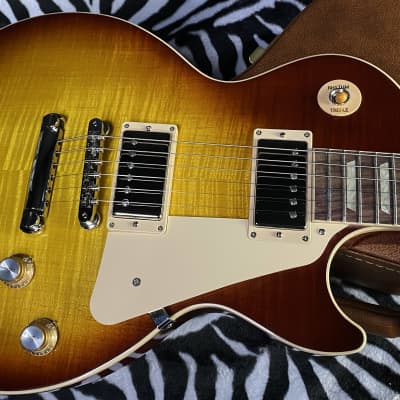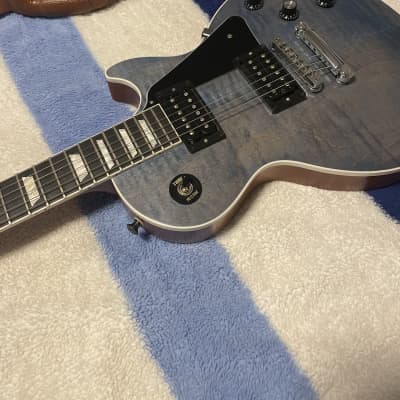The Gibson Les Paul is considered to be one of the two most important electric guitar models of all time. First released in the early 1950s, the Les Paul has now been produced in thousands of variants over the years, with the core design spinning off into a vast constellation of Les Paul sub-models and families. Gibson also has a tendency to switch up the specs of specific models year-to-year, resulting in a mind-bogglingly diverse pool of instruments to sift through if you're trying to buy a Les Paul.
Here on Reverb, there is an ample selection of different Gibson Les Pauls for sale spanning the known universe of old and new models. While it would be impossible to describe the ins and outs of every model and era in just one page, with this guide, we will outline the major model families, providing a good starting point on your quest for the one that's right for you. As you scroll, you can click on the individual model callouts for a quick glance at what we have in stock, including different finish options and pricing history for every model.
Below, we're keeping the focus strictly on Gibson guitars. If you're interested in something a little more affordable, take a look at this guide to the many excellent Epiphone Les Paul models available.
What to Consider When Buying a Gibson Les Paul
Price Range
When making any guitar purchase, think of your price range first. It will be a good way to hone in on a smaller field of options. On the used market, Gibsons typically start in the $700 USD range for basic models. If you're looking to stay below that, an Epiphone Les Paul may be a better option for you. You can get a good sense of which Gibsons fit into what price bracket by looking at the options we've highlighted below. Keep in mind that on Reverb, most sellers allow you to make offers on their listings. This means that you can land a deal at a lower final price than what you see listed.
Used vs. New
While the thought of a factory-fresh guitar definitely has its appeal, buying used can save you money and give you access to a wide range of Les Pauls. Used Les Pauls on Reverb can be beat-up road warriors, mint condition specimens, or anything in between. Our used inventory encompasses decades' worth of special editions, model updates, finish options, and other variations. Don't limit your search for a Gibson to only this year's models.
Neck Profiles
One way in which different Les Paul models vary is in the shape of the neck and how it fits in your hand. Typically, Gibson necks fall into two broad categories: Those labeled as having a '50s-style neck tend to be a bit chunkier, rounder, and more C-shaped. Those with a '60s-style neck will be a bit thinner in what's sometimes called a D-shape profile. There's variation beyond that as well, and when looking at a specific listing on Reverb, it's the sort of thing you can always message the seller to ask about before making an offer.
Flame Tops and Finish
Most Les Pauls have a piece of carved maple on the top of their mahogany body, and Les Paul aficionados tend to value those with a high degree of flaming or figuring in the wood. If you see a Les Paul labeled as "Premium" or "Plus" or "AAA," that denotes a higher grade flame. Usually, these guitars carry high-quality, glossy finishes that really showcase the stripes. Lower-end options like the Les Paul Studio tend to use darker finishes, which do not reveal any flame on their tops. Other options, like the Les Paul Tribute line, use more economic "satin" finishes, which obscure the wood altogether.
Pickups
Standard Les Pauls are generally based on the template set in the late '50s and include humbucker pickups. These days, most models use humbuckers inspired by the original P.A.F. pickups of that vintage era, such as the '57 Classics or Burstbuckers. These sorts of pickups are known for their big, round tones and are a fundamental ingredient in the classic Les Paul recipe. That said, there are plenty of models that use different pickups such as the thinner mini-humbuckers found on the old Les Paul Deluxe and the older-school P90s found on a number of model spin-offs. Of course, once you buy a Les Paul, you can always swap in new pickups and explore other options—just make sure you keep the original to maintain resell value.
Custom Shop and Vintage Options
At the opposite end of the spectrum from the Studio and Tribute Les Pauls, you'll find Gibson Custom Shop and top-shelf vintage Les Paul options. In this range, there are even more variations and idiosyncrasies to consider—you can read a little more about the particulars at the bottom of this page.
Model Family and Type
While the number of Les Paul variations out there is truly astounding, there remain some core groupings that have existed during the past few decades. While unsurprisingly, within each of these, there are plenty more variations and exceptions to every rule. Generally speaking, these groupings provide a good starting point for any Les Paul shopper. Keep scrolling for a high-level breakdown of what defines each of these Les Paul sub-species.
The Best Les Pauls on Reverb
Check out the most popular Les Pauls on Reverb right now, updated daily.
Les Paul Standards
The mainstay model the rest are judged against
Les Paul Studios
Just the essentials with less panache
Les Paul Traditionals
A heavy duty '50s-style model for that original LP experience
Les Paul Classics
A less common, '60s-style Les Paul with plenty of deals to be found
Les Paul Customs
A luxurious option with a history all its own
Les Paul Specials and Juniors
Vintage-style bare-bones model with general Les Paul vibes
While a fundamentally different design than the Les Pauls mentioned above, the Les Paul Special and Junior—both of which go back to the '50s—are solid options for people who just want an affordable Les Paul–esque guitar. These models do not have carved maple and instead are built around slab bodies, like a Fender Telecaster. They're also well-known as longtime punk favorites, having been used by players like Billie Joe Armstrong and Joan Jett, both of whom have had signature models.
Vintage Les Pauls
The world of vintage Les Pauls is a vast topic with shelves of books devoted to exploring every nuance and detail about the first couple generations of Les Paul design and production. If you're interested in swimming in these vintage waters, you'll want to start by thinking about your budget, the era of production that dictates, and then start combing through individual listings on Reverb. In doing so, you should pay close attention to the seller's images and stated conditional issues, and feel free to ask questions via the message link on every listing page.
Generally speaking, Les Pauls from the '50s are the most desired, and the "Burst" Les Paul Standards from the late '50s are some of the most sought-after vintage guitars on the market. Gibson did not produce any Les Pauls as we know them between 1961 and 1968, and the ones from the late '60s are also highly regarded. Les Pauls from '70s are far less desired and carry a reputation for inconsistent quality and endemic problems. That said, there are plenty of cool guitars from this period (known to collectors as the "Norlin Era") that carry a lot of player-grade personality.
Custom Shop Les Pauls
Custom Shop Les Pauls sit at the very top of the heap of modern Gibson guitars. While there are some mainstay models, like the '58 Les Paul Reissue, the guitars you'll find in the Custom Shop catalog will have a lot of variation guitar-to-guitar, with tons of artist signatures, special editions, and limited runs. Like the regular production models above, Custom Shop Les Pauls also have gone through spec changes through the years, and typically, buyers of these guitars focus on the particulars of individual listings much as they would a vintage specimen.



